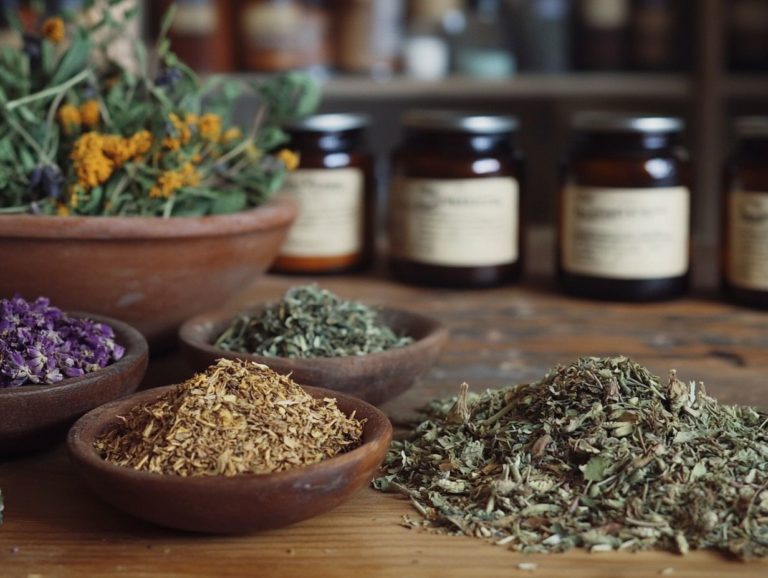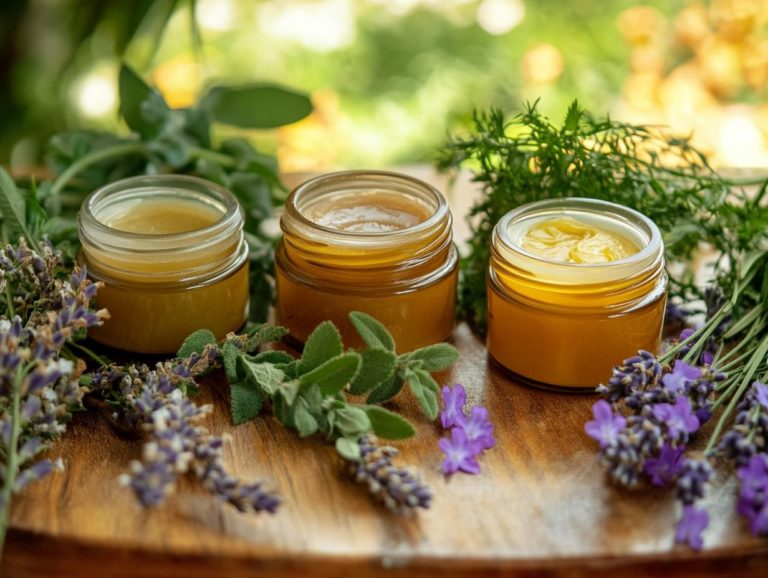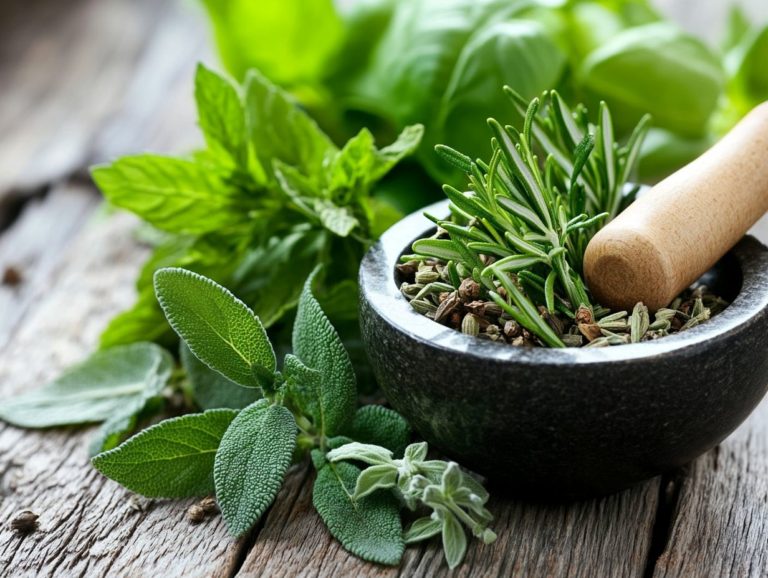How Effective Are Herbal Remedies for Coughs?
Coughs can be quite annoying and uncomfortable. They often hint at an underlying issue that deserves your attention.
While many people rely on traditional medications, a growing number are turning to herbal remedies as natural alternatives.
Get ready to explore the many types of coughs and discover effective herbal remedies that can bring relief!
This article highlights the common herbs and plant extracts that can ease cough symptoms. You ll also uncover the scientific evidence supporting these remedies, along with insights into potential side effects and guidance on safe usage.
Learn how to seamlessly incorporate herbal solutions into your cough treatment plan, complementing conventional medicine for optimal results.
Contents
- Key Takeaways:
- Understanding Coughs
- Common Herbal Remedies for Coughs
- Effectiveness of Herbal Remedies for Coughs
- Possible Side Effects and Risks
- Unlock the Benefits: Use Herbal Remedies Safely!
- Incorporating Herbal Remedies into Your Cough Treatment Plan
- Frequently Asked Questions
- 1. How Effective Are Herbal Remedies for Coughs?
- 2. What are some common herbal remedies for coughs?
- 3. Are there any potential side effects of using herbal remedies for coughs?
- 4. Can herbal remedies be used for both dry and wet coughs?
- 5. Are there any herbal remedies specifically for children’s coughs?
- 6. How long does it take for herbal remedies to work for coughs?
Key Takeaways:

- Herbal remedies can help treat coughs, but their effectiveness varies with the type and severity of the cough.
- Research shows that certain herbs and plant extracts can relieve cough symptoms.
- Always consult a doctor before using herbal remedies, especially with traditional medicines.
Understanding Coughs
To understand coughs, you need to know the factors that cause them. Coughing often stems from respiratory infections like the common cold or acute bronchitis.
Coughing acts as a reflex to clear irritants from the throat and respiratory tract. It can also indicate underlying conditions such as chronic cough or allergies.
Symptoms can vary significantly, ranging from mild irritation to pronounced inflammation. This ultimately influences your overall immune system response.
Types of Coughs
Coughs are primarily categorized into two types: dry cough and wet cough, each with unique characteristics and causes.
A dry cough often stems from throat irritation. In contrast, a wet cough is typically accompanied by mucus and is linked to conditions like chronic cough, acute bronchitis, or respiratory infections.
Understanding these distinctions enhances your ability to effectively diagnose and treat the issue. It ensures that underlying conditions, such as allergies or serious respiratory disorders, are not overlooked.
Identifying whether you’re dealing with a dry or wet cough is essential for managing your symptoms and improving your overall health.
Common Herbal Remedies for Coughs
When exploring herbal remedies for coughs, you find many natural solutions that can ease symptoms and soothe irritation.
Ingredients like honey, ginger, thyme, and peppermint act as gentle cough suppressants and have a range of medicinal properties.
It’s no wonder these herbs are favored options for those seeking natural relief.
Herbs and Plant Extracts Used for Cough Relief
Several herbs stand out for their effectiveness in providing cough relief. Ginger, honey, and thyme are renowned for their soothing properties.
Herbal teas infused with slippery elm or marshmallow root can coat your throat, while turmeric and peppermint offer anti-inflammatory benefits that ease discomfort.
Incorporating these herbs into your daily routine can yield noticeable relief. For example, you might steep ginger in hot water to create a tea that soothes a sore throat and bolsters your immune system.
Honey, celebrated for its antimicrobial qualities, can be used in herbal syrups or taken directly to alleviate irritation.
Thyme can be brewed into a tea that acts as an expectorant, effectively clearing mucus.
Each of these natural remedies provides immediate relief while contributing to overall health, making them valuable allies in the battle against persistent coughs. Additionally, many are curious about whether herbal remedies are effective for weight loss, as they may also support overall wellness.
Effectiveness of Herbal Remedies for Coughs
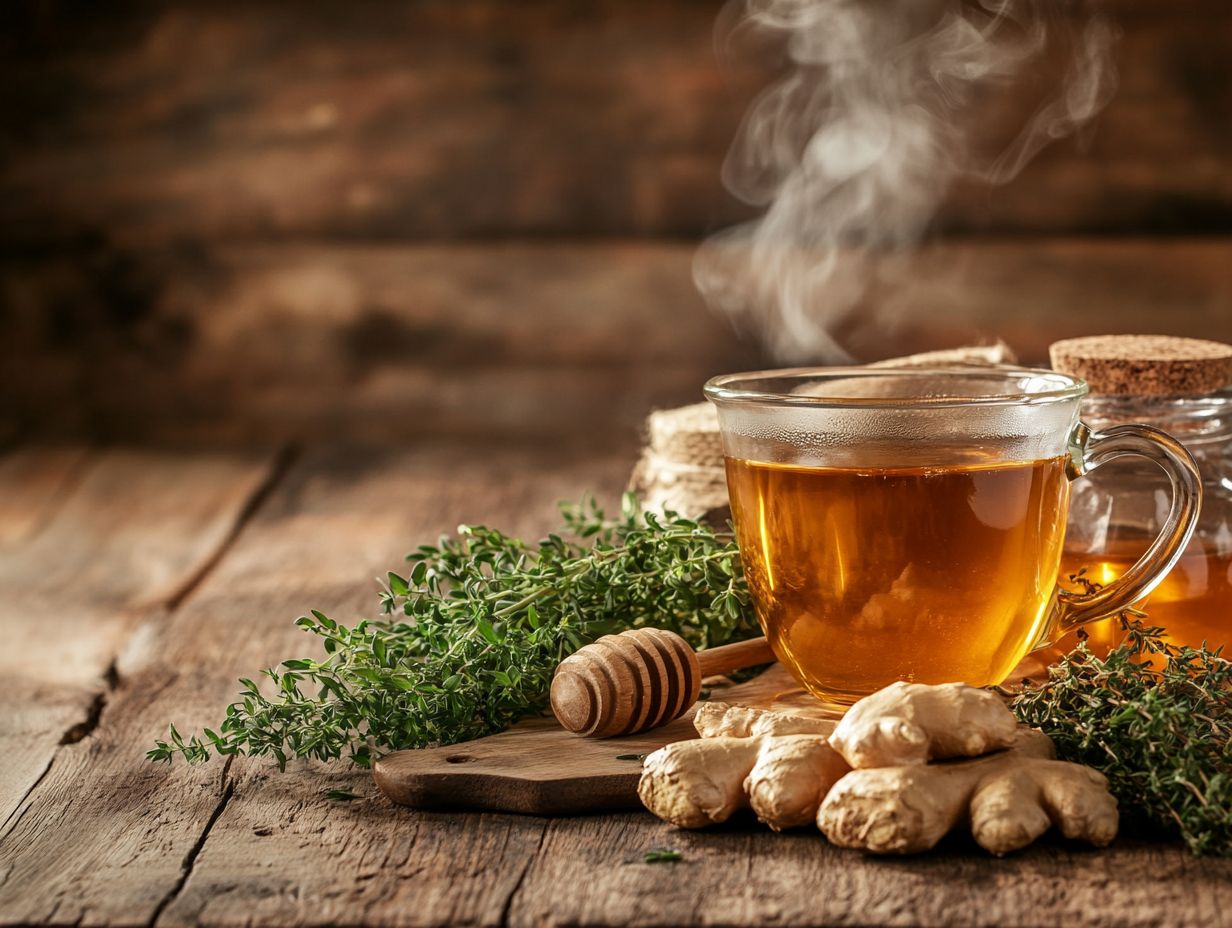
The effectiveness of herbal remedies for coughs is gaining considerable traction in the realm of scientific research, which underscores their natural cough-suppressant and anti-inflammatory properties.
Evidence indicates that remedies like honey and ginger can offer substantial relief from various cough symptoms, harnessing their remarkable healing properties. For those interested in exploring more options, check out the most common herbal remedies to benefit your well-being.
Scientific Evidence and Studies
Numerous scientific studies have examined the effectiveness of herbal remedies like honey, ginger, and marshmallow root in treating coughs, and the results are quite promising. Research suggests that these natural ingredients not only offer symptomatic relief but may also help tackle underlying respiratory issues.
Among these findings, honey stands out as a soothing agent for throat irritation, serving as a natural cough suppressant, especially for children. Ginger also has anti-inflammatory properties that can alleviate symptoms tied to respiratory distress.
Marshmallow root is recognized for its gel-like substance that can soothe the throat, protecting it from further irritation.
Together, these herbal remedies enhance your comfort during coughing episodes and support overall respiratory health by promoting healing and reducing inflammation. To understand their effectiveness, it’s helpful to explore how herbal remedies work. They showcase their potential as viable alternatives to conventional treatments, making them worthy of consideration.
Possible Side Effects and Risks
While you may view herbal remedies as safe alternatives for treating coughs, it s crucial to be aware of potential side effects and risks that accompany their use.
You could experience allergic reactions or adverse interactions with medications, so be cautious.
Potential Interactions and Allergies
Using herbal remedies like ginger, honey, and turmeric can lead to potential interactions and allergies, underscoring the necessity of informed usage. If you have specific allergies or are on certain medications, it s essential to exercise caution, as interactions may arise.
These natural substances often come with a reputation for being harmless, yet they can sometimes produce unexpected effects when mixed with pharmaceuticals. For example, ginger might amplify the effects of blood thinners, heightening your risk of bleeding. Turmeric has been known to interfere with anticoagulants and diabetes medications.
Allergic reactions can also manifest, with symptoms ranging from mild rashes to severe anaphylaxis.
Therefore, it s vital to engage in an open dialogue with your healthcare provider if you re considering these herbal options. This keeps your health journey safe and effective while allowing you to enjoy the benefits of nature s remedies.
Unlock the Benefits: Use Herbal Remedies Safely!
Using herbal remedies safely requires a clear understanding of proper dosage and administration guidelines. By doing so, you can maximize their efficacy while minimizing any associated risks.
It’s crucial to adhere to recommended guidelines to steer clear of potential side effects and fully enjoy the natural benefits these cough suppressants offer.
Dosage and Administration Tips
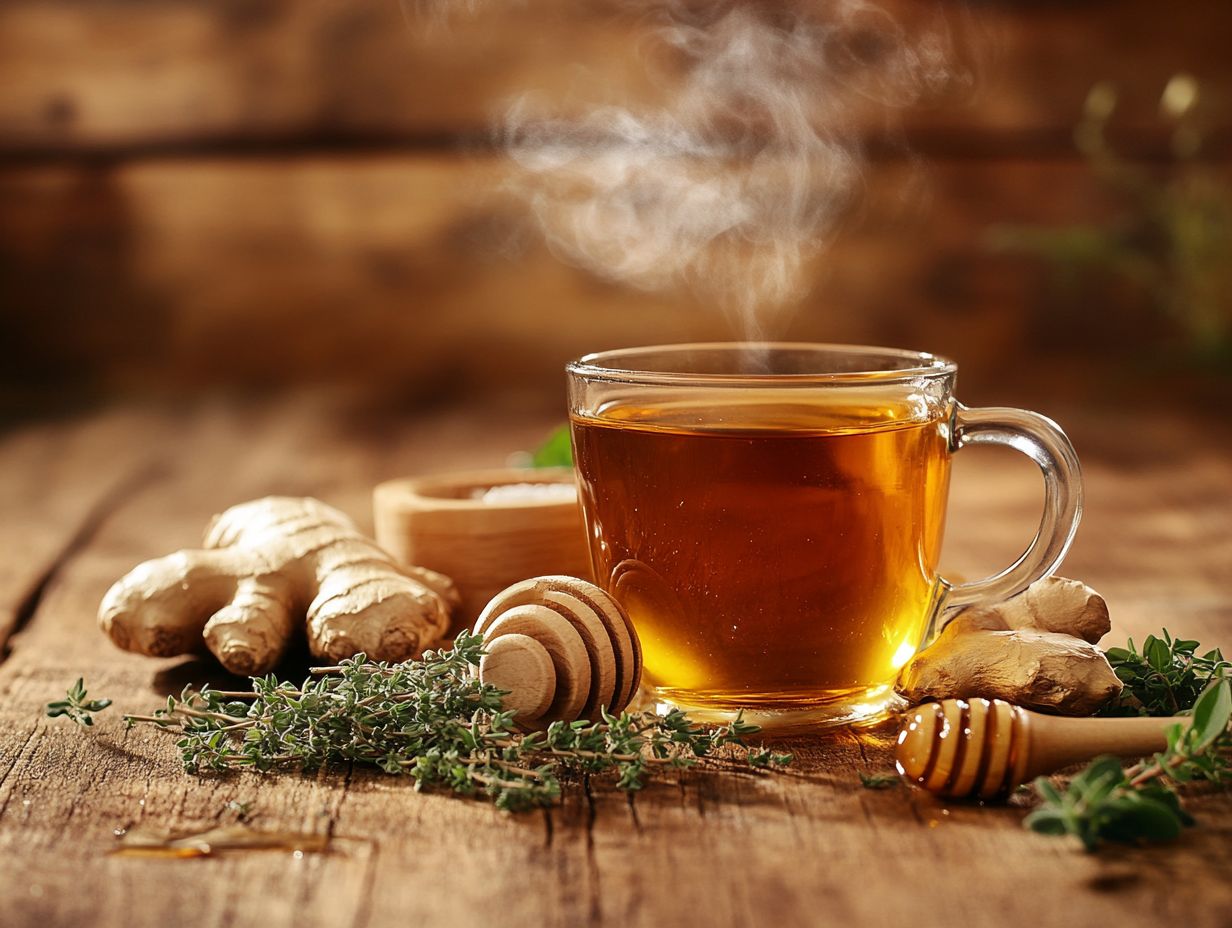
Determining the right dosage and administration methods for herbal remedies like honey, ginger, and slippery elm can greatly enhance their effectiveness in treating coughs. Clear guidance on how to incorporate these remedies into your daily routine is essential for maximizing their benefits.
For honey, the common recommendation is to take one to two tablespoons daily, either straight or blended into warm water to calm your throat. Ginger, known for its anti-inflammatory properties, can be enjoyed as a tea by boiling fresh slices in water for about 10 minutes. A suggested intake is two to three cups each day. Slippery elm, which soothes irritation, can be consumed as a powder mixed with warm water, with a typical dosage of one to two teaspoons to help coat your throat.
Understanding these preparation techniques can significantly boost the efficacy of these natural remedies, providing much-needed relief from persistent coughs.
Incorporating Herbal Remedies into Your Cough Treatment Plan
Don’t miss out! By adding herbal remedies to your cough treatment, you can boost your recovery! Integrating these remedies can elevate your treatment plan, especially when used alongside traditional medicine and home remedies.
Understanding how to blend these approaches allows for a more holistic treatment for both cough symptoms and their underlying causes.
Combining with Traditional Medicine
Combining herbal remedies with traditional medicine offers benefits that work well together. This holistic approach enables a deeper understanding of cough management, addressing both symptoms and underlying causes.
For instance, pairing honey with over-the-counter cough suppressants can soothe your throat and alleviate irritation, making recovery more pleasant. Similarly, using herbal solutions for cold and flu symptoms like thyme or marshmallow root can hydrate your respiratory tract, helping to combat persistent coughs with ease.
This integration enriches your treatment plan and enables you to take control of your wellness journey. By blending these natural options with conventional therapies, you can promote faster healing and better overall health outcomes.
Consulting with a Healthcare Professional
Consulting with a healthcare professional is essential when considering herbal remedies for coughs. Their expertise ensures you navigate this path safely and effectively, guiding you toward the best options tailored to your unique needs.
By seeking their advice, you gain valuable insights into proper dosages, potential interactions with any prescribed medications, and an overall strategy for managing your cough. This collaborative approach boosts the effectiveness of herbal treatments, including herbal remedies for allergies, and minimizes the risk of undesirable side effects, contributing to a more holistic healing experience.
Healthcare professionals assess personal health conditions, allowing them to make informed recommendations that work harmoniously with other therapies. Prioritizing professional guidance paves the way for a safer journey toward wellness and enables you to make educated choices regarding your health.
Frequently Asked Questions
1. How Effective Are Herbal Remedies for Coughs?
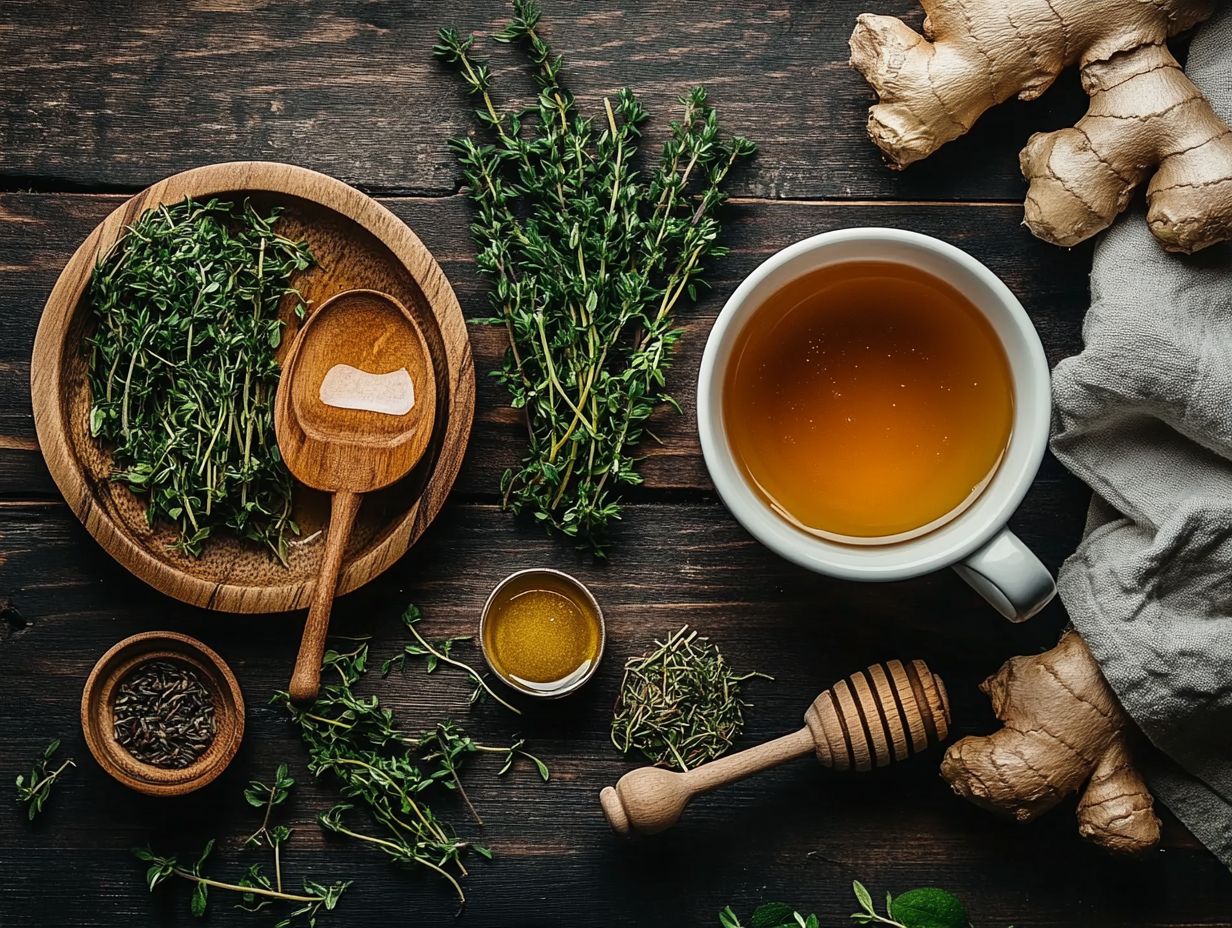
Herbal remedies for coughs have been used for centuries and are often effective in relieving cough symptoms. However, effectiveness may vary depending on the individual and the specific herb used.
2. What are some common herbal remedies for coughs?
Some common herbal remedies for coughs include ginger, honey, marshmallow root, and eucalyptus. These herbs have natural expectorant properties, meaning they help clear mucus from your airways, and anti-inflammatory qualities that can soothe coughs and clear chest congestion.
Call to Action: Consider consulting a healthcare provider about incorporating herbal remedies into your cough treatment plan today!
3. Are there any potential side effects of using herbal remedies for coughs?
Herbal remedies are generally safe, but they can cause side effects. These may include allergic reactions, interactions with medications, and stomach discomfort.
Always consult a healthcare professional before using any herbal remedies for coughs.
4. Can herbal remedies be used for both dry and wet coughs?
Herbal remedies work for both dry and wet coughs. For dry coughs, soothing herbs calm throat irritation.
For wet coughs, expectorant herbs help clear mucus and ease breathing.
5. Are there any herbal remedies specifically for children’s coughs?
Yes! Some safe herbal remedies for kids include thyme, slippery elm, and licorice root.
Always consult a pediatrician before giving herbal remedies to children.
6. How long does it take for herbal remedies to work for coughs?
The time it takes for herbal remedies to work varies by individual and cough severity. Typically, you might see improvements in a few days to a week.
For the best results, stick to the recommended usage of the remedies.

